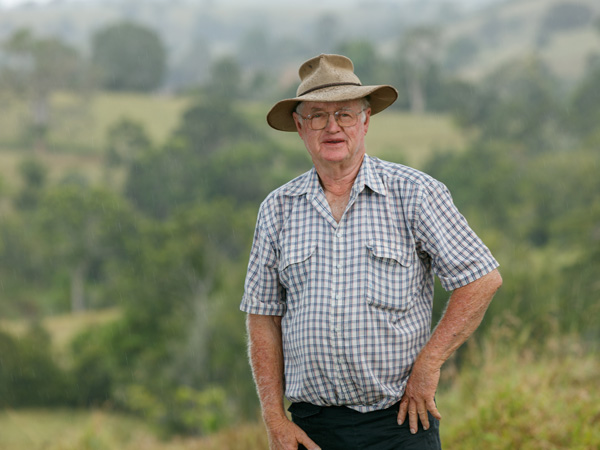Dung beetles get busy on water quality
By Terrain NRM
A group of cattle owners from the Atherton Tableland have introduced select species of dung beetles with the aim of improving pasture condition and water quality.
Nineteen properties have been strategically chosen as ‘seed-properties’ for the dung beetle introduction and environmental evaluation project, supported by Terrain NRM through funding from the Australian Government.
The Tableland currently has 500 cattle businesses, managing 90,000 head of cattle, with each animal producing up to 20kg of manure a day.

Grazier and president of the Malanda Beef Plan Group, Bruce Carcary. Photo: Terrain NRM Tableland.
If left on the surface, cowpats can lose up to 80 percent of their nitrogen. An active dung beetle population has the potential to cycle nutrients and organic matter back into the soil within 24-48 hours, instead of it being lost to the atmosphere, surface water or groundwater. This can reduce the need to use as much fertiliser for pasture maintenance, and nutrients are prevented from being washed into waterways by heavy rain.
“Though there are some beetle species already here” says Rob Pagano, one of the main drivers of the project, “they are not active in all seasons or across all properties, soil types, rainfall zones and the like. What the project has done is introduce a greater diversity of species to see if they can survive, thrive and expand across the region under those varying conditions.”
Six species of beetles have been released across the properties. The producers have been monitoring species survival rates and their spread across the property as well as their effectiveness in processing the dung.
The new and improved dung beetle population will also combat an unpopular stock pest, the buffalo fly, by destroying the fly’s cow dung breeding ground. This would be another welcome outcome for producers.
Bruce Carcary, president of the Malanda Beef Plan Group, says that cattle owners need to use more selective worming formulations for beetles to thrive across the region.
“In order for us to reap the benefits from beetles we need to make an attitude shift and use more selective worming formulations for our stock so that the dung-beetle larvae are not wiped out. This is essential for the beetles to survive and expand across the region,” Bruce said.
Rob said, “It can take up to three years before it can be determined if species have successfully established. This is due to the very varied seasonal activity and life cycles of the different species as well as variations in weather conditions.”
For the Malanda Beef Plan Group, it’s now a matter of patient monitoring and encouraging the use of beetle-friendly worming formulations.
For more information contact Terrain NRM on (07) 4043 8000 or email [email protected] or visit our website http://www.terrain.org.au.



